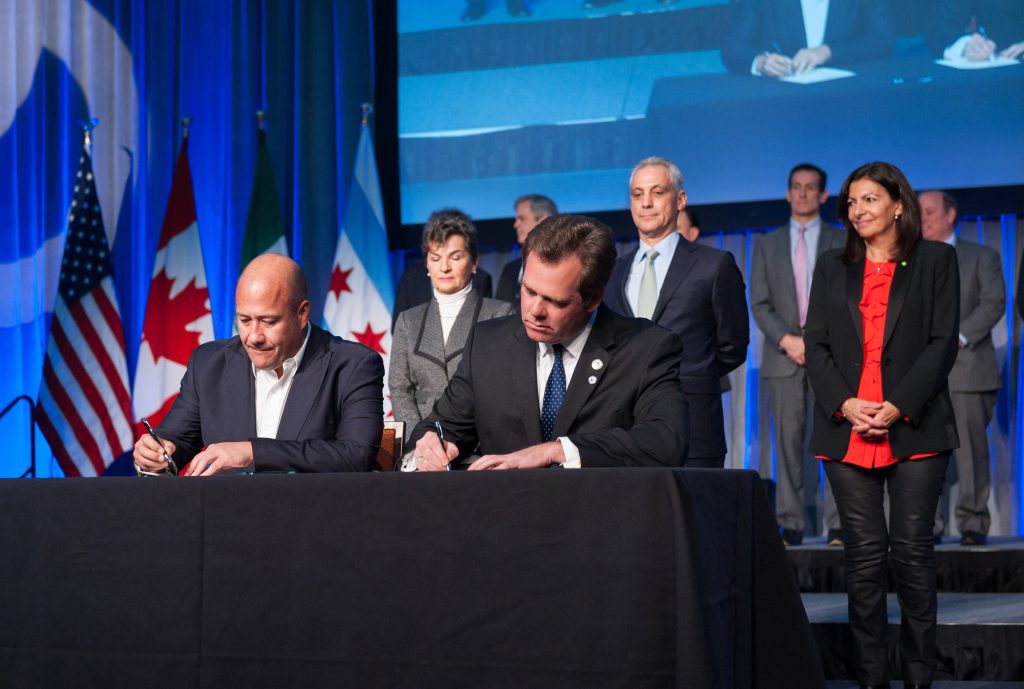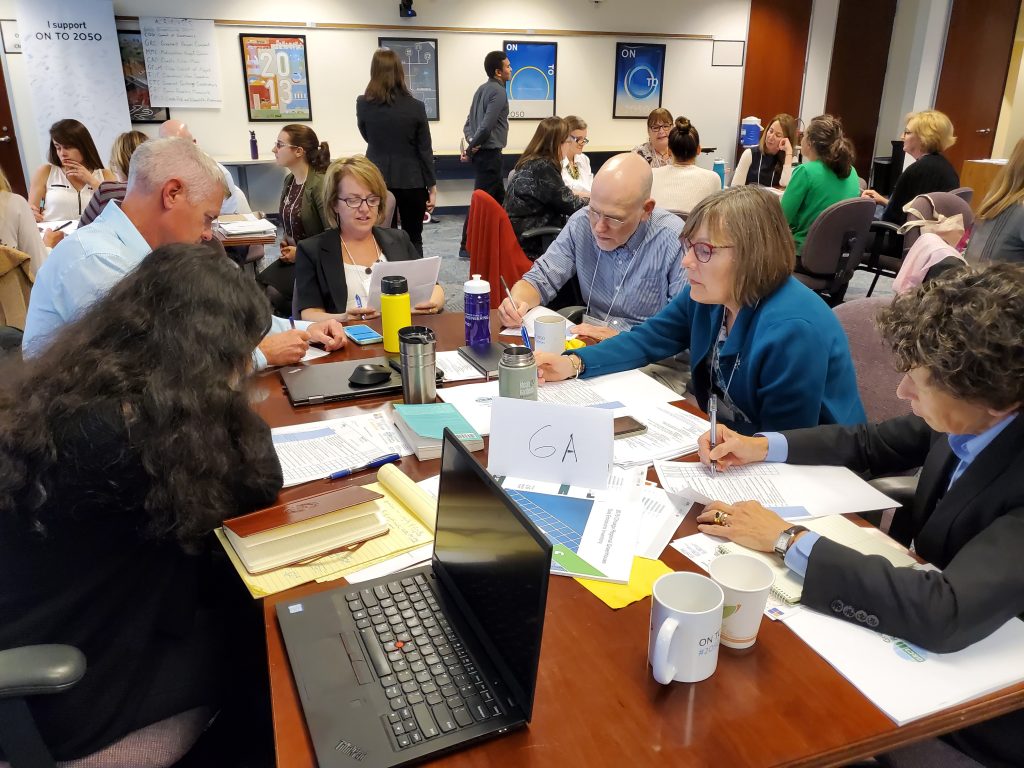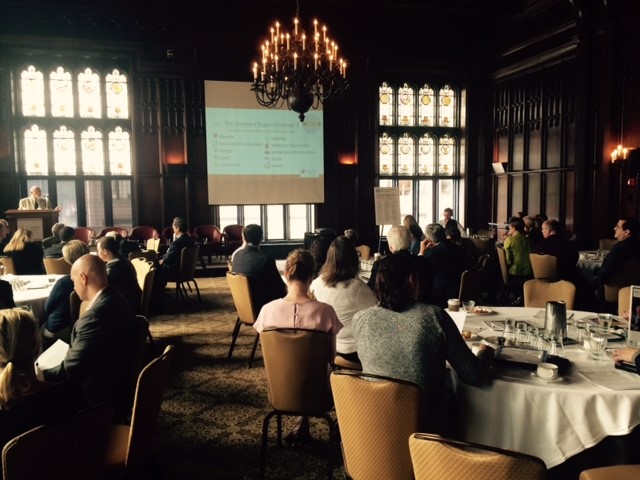Priority Climate Action Plan Completed
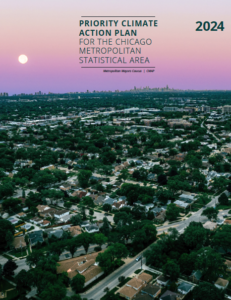 On March 1, 2024, the Caucus completed the Priority Climate Action Plan (PCAP) for the Chicago Metropolitan Statistical Area (MSA) to support eligible jurisdictions seeking funding for the implementation of Priority GHG Reduction Strategies identified by this plan. Implementation grant applications are due on April 1, 2024.
On March 1, 2024, the Caucus completed the Priority Climate Action Plan (PCAP) for the Chicago Metropolitan Statistical Area (MSA) to support eligible jurisdictions seeking funding for the implementation of Priority GHG Reduction Strategies identified by this plan. Implementation grant applications are due on April 1, 2024.
The U.S. EPA has created the Climate Pollution Reduction Grant (CPRG) Program to support states, large metropolitan regions, tribes, and territories in planning for potential investment in strategic climate action through the Inflation Reduction Act. The U.S EPA has supported the Caucus to lead in the development of the PCAP as a pre-requisite to funding requests from any organization within the Chicago MSA seeking implementation grants.
The U.S. EPA describes eligible applicants in the CPRG Implementation Grant General Competition Notice of Funding Opportunity (NOFO): “…entities eligible to apply for an implementation grant under this announcement are states, municipalities, air pollution control agencies… that seek funding to implement one or more GHG reduction measures that are included in an applicable PCAP (submitted to EPA by March 1, 2024). An applicable PCAP is one that geographically covers the entity and contains GHG reduction measures that can be implemented by the entity.”
In preparing, CPRG Implementation grant applicants should: 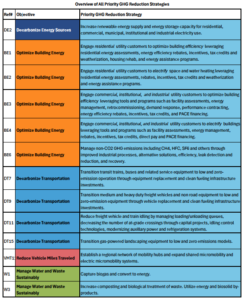
- Reference the following relevant Priority GHG Reduction Strategy or Strategies in the CPRG Implementation grant applications. See Sections 5 and 6 of the PCAP for complete information about these Priority GHG Reduction Strategies.
- Reference low-income and disadvantaged communities (LIDAC) that will benefit from the implementation of the proposed CPRG Implementation project using the LIDAC list here (Excel LIDAC list, PDF LIDAC list). See also PCAP Section 7 and Appendix D and E.
Note: The Priority GHG Reduction Strategies are meant to be inclusive of all strategic actions that will effectively implement the Strategy within the five-year implementation period of the grant and meet the goals of the CPRG program.
Applicants outside of the Chicago MSA may reference any Priority GHG Reduction Strategy that is included in their relevant State PCAP – Illinois PCAP, Indiana PCAP, Wisconsin PCAP.
PCAP Background
The Caucus is the lead organization for the Climate Pollution Reduction Grant program for the Chicago MSA. The 2021 Climate Action Plan for the Chicago Region served as the foundation for the PCAP.
The eight climate mitigation objectives identified in the Caucus’ CAP anchored the PCAP. They are:
- Demonstrate Leadership to Reduce Emissions.
- Decarbonize Energy Sources.
- Optimize Building Energy.
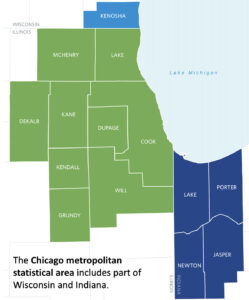
- Implement Clean Energy Policies.
- Decarbonize Transportation.
- Reduce Vehicle Miles Traveled.
- Manage Water and Waste Sustainably.
- Sustain Ecosystems to Sequester Carbon.
The bolded objectives have the greatest potential to significantly reduce GHG emissions.
In the PCAP, the Caucus integrated strategies that will most effectively reduce emissions and best position the Chicago MSA to compete for CPRG investment. The Chicago Metropolitan Agency for Planning (CMAP) contributed greatly to the development of the PCAP.
In the long term, CMAP will lead in the development of a Comprehensive Climate Action Plan (CCAP) for the Chicago MSA, which is due in 2025. This plan will integrate additional components, including more precise GHG reduction measures, workforce development, and low-income and disadvantaged community benefits analyses.

Pioneering Regional Climate Plan
The Caucus led in the development of the 2021 Climate Action Plan for the Chicago Region, which is the first climate action plan for the Chicago region and was only the third such regional plan in the United States at the time of its release.
The Climate Action Plan (CAP) for the Chicago Region uses regional greenhouse gas data and a regional climate risk and vulnerability assessment as the foundation. Stakeholder engagement enriched the planning process, drawing in 270 voices from 175 organizations, including representatives of 53 municipalities and counties.
![]()
The CAP sets science-based mitigation targets for greenhouse gas emissions reduction and equitable climate adaptation targets. The entire plan is rooted in equity, and consideration of cross-cutting benefits and equitable outcomes are woven throughout.
Although the plan is regional in scope, the strategies in the plan are specifically tailored for action at the municipal scale. Municipal governments are uniquely positioned to lead, enact policies, and encourage others to take action. These three roles are prominent throughout the plan because they reflect unique municipal strengths and authorities to take climate action.
Regional CAP and a Global Partnership
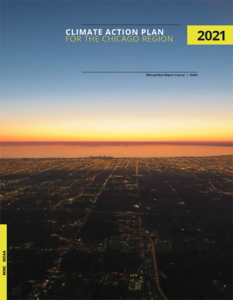 Work on the plan started in August 2019, when the Global Covenant of Mayors for Climate & Energy (GCoM) chose the Chicago area as one of a few regions in the U.S. to demonstrate the power of regional and collaborative climate change planning. GCoM and an EU-funded program recognized the Caucus’ Greenest Region Compact (GRC) collaborative as a leading force in municipal sustainability.
Work on the plan started in August 2019, when the Global Covenant of Mayors for Climate & Energy (GCoM) chose the Chicago area as one of a few regions in the U.S. to demonstrate the power of regional and collaborative climate change planning. GCoM and an EU-funded program recognized the Caucus’ Greenest Region Compact (GRC) collaborative as a leading force in municipal sustainability.
For a year and a half, the Caucus worked with GCoM and experts at the National Oceanic and Atmospheric Administration (NOAA) to develop a regional climate plan that connected to the Greenest Region Compact and the U.S. Climate Resilience Toolkit’s Steps to Resilience. Specifically, the Caucus and NOAA worked to assess climate-related risks and engage stakeholders in setting targets and developing strategies to reduce greenhouse gas emissions and to develop resiliency to climate change impacts. The project also drew on foundational work completed by the Chicago Metropolitan Agency for Planning (CMAP) to inventory greenhouse gas (GHG) emissions in the region and assess climate risks.
Read the full Climate Action Plan or the Summary Document. You may also download the Excel spreadsheet versions of Appendix D: Mitigation Strategies or Appendix E: Adaptation Strategies, which can be used for your community’s planning purposes.
Climate change is an urgent threat facing local governments, the economy, community safety, and individual well-being. A global concern, climate change impacts will be felt at the community scale, too. Increasingly, the role of mayors has been to lead communities toward solutions that mitigate pollution from greenhouse gases (GHG) and manage risks. Municipal leaders can make decisions that reduce their community’s contribution to greenhouse gas emissions. In fact, 65% of Caucus members have collectively reduced CO2 emissions by 76 million pounds through simple building energy efficiency in recent years.
However, a multi-jurisdictional approach is needed for addressing the climate crisis. Regional collaboration is key because the issues that are affecting the climate, such as transportation, cross municipal boundaries and require more resources than individual communities have on their own. In addition, if one municipality reduces GHG emissions but the larger region makes no progress, climate change and its related impacts will accelerate. The same can be said at broader scales. If Chicagoland reaches net zero emissions but the state and nation take no action, the climate crisis will worsen. This plan positions us as leaders in the national effort to mitigate that crisis.
The Caucus will work with its membership, starting with its 165 GRC signatories, to undertake these common-sense strategies so that, collectively, we may address the depth and complexity of the climate crisis.
Join Us
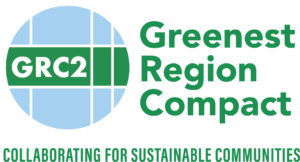 Many cities around the world may pledge to take bold actions to reduce greenhouse gas emissions. In our region, 165 communities and all of the councils of government have already adopted the consensus sustainability goals of the Greenest Region Compact (GRC), which is the largest regional collaborative of municipalities working toward sustainability in the United States. The GRC is our foundational sustainability pledge. It offers a solid framework for meaningful climate action, is suited to communities of all sizes and strengths, and also focuses on improving the quality of life for residents in the region. Adopt the GRC through municipal resolution and report your community’s adoption to the Caucus.
Many cities around the world may pledge to take bold actions to reduce greenhouse gas emissions. In our region, 165 communities and all of the councils of government have already adopted the consensus sustainability goals of the Greenest Region Compact (GRC), which is the largest regional collaborative of municipalities working toward sustainability in the United States. The GRC is our foundational sustainability pledge. It offers a solid framework for meaningful climate action, is suited to communities of all sizes and strengths, and also focuses on improving the quality of life for residents in the region. Adopt the GRC through municipal resolution and report your community’s adoption to the Caucus.
The Caucus also asks municipalities to lend their support to the Climate Action Plan for the Chicago Region by considering this resolution at an upcoming City/Village Board meeting. The resolution is a simple recitation of the core goals and objectives of the Climate Action Plan for the Chicago Region. Following the vote, please share with us a signed copy of the resolution for purposes of creating true regional cooperation, collaboration and momentum. See the full list of communities that have supported the Climate Action Plan by resolution.

